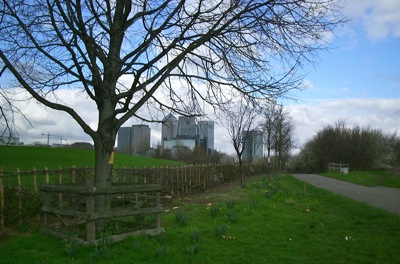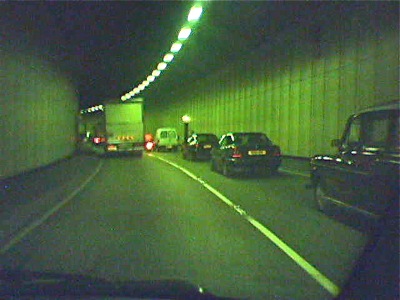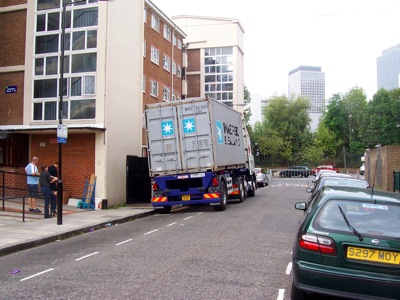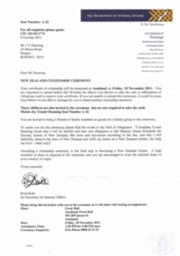“Oh…Dear…Lord…”
My neighbour, whose fingers were clamped deeply and firmly into the headrest in front of him, was clearly not enjoying the flight and spent a good deal of it in the ‘brace’ position recommended on the card in the pocket in front of him. To be fair, a small propeller-driven commuter aircraft flying up New Zealand’s west coast is not necessarily where one would choose to be when springtime Westerlies are blowing in across the Tasman from Australia. Riveting though the in-flight magazine was, it was no match for the drama unfolding in the cabin during the one hour flight from Palmerston North to Auckland. After complimentary coffee and tea had decorated enough laps and the hostess had fallen over twice, the cabin crew gave up serving the in-flight breakfast snack and passed amongst the passengers with rosaries, lucky heather and next-of-kin forms. Massive air pockets sent the plane lurching earthwards, leaving me an inch above the seat straining against my belt, until our descent was arrested by vigourous updrafts that pushed me down into the padding like a large invisible hand. Combined with the gale howling the other side of the small Plexiglass window, these roller-coaster moments made for an interesting trip and the relief of being back on the ground was evident on the faces of my fellow passengers as we filed across the apron to the terminal building.
I had flown to Auckland for an interview with the deputy HR director of a large national organisation. The interview had come about as a result of a ‘float’ by one of the recruiters I am using. A float, I discovered, is recruiter jargon for pitching a candidate to a prospective employer without a particular role in mind. Whilst this might sound a bit hit and miss, New Zealand’s present economic climate, low rate of unemployment – most employable people are gainfully employed – and static population mean that even the best of positions might only receive two or three applications. This being the case, employers are keen to meet with a promising candidate in the hope that they can match them to existing or upcoming roles in their organisations. In this case, the float was a good one, not only from from my point of view but that of the HR director and operations manager I interviewed with as well. The organisation seems to offer what I’m looking for and, I’m reliably informed, their feedback regarding me was unusually positive, with a specific commitment to try and find a role within the organisation that I could formally apply for.
Suitably cheered by the positive response, I returned from Auckland only to find that I shall have to fly back again next week, for a pre-interview with another recruiter concerning a position with a utility company. Should this gives the impression that job hunting in NZ is simply a matter of jetting about meeting people, then let me set the record straight. Far away from our old lives and networks, I have found it hard to establish an effective daily job hunting routine and securing two interviews in two weeks belies the routine slog that brought them about. Given that we have no landline telephone and therefore no fixed internet access at the beach house, establishing some sort of routine has become essential to making any progress in my job hunting. Usually, this routine involves checking the career sections in the New Zealand Herald and the Dominion Post (Mondays, Wednesdays and Saturdays), highlighting suitable roles and creating a tracking file for each role or recruiter. In these files, I record all the ad details, emails, phone conversations and meetings regarding each role. Given that, as of today, I am actively working with seven recruiters on six separate applications, not to mention other agencies I am registered with or jobs I’m applying for direct, I need to be comfortable with my system and confident I am on top of all that I need to do each day. As someone used to having at least 2Mb broadband access, fixed line telephone and a home office space to work with, trying to work without such things has been more of a challenge than I had bargained for.
My iBook and my new Nokia 6680 are both Bluetooth-capable and this means, in theory at least, that I can get online and work anywhere I can get a decent phone signal and faster 3G access in the major cities. In practise, things are a little more difficult and this has proven to be the most frustrating aspect of life here for me so far. GPRS, that is to say a fast data connection via my cellphone, is pretty costly here and means a pre-pay phone like the one SWMBO is using is out of the question, so I chose the 3G phone hoping to benefit from a faster service on a cheaper account tariff. Without an established credit history, signing up for a mobile account without a credit limit has been a trial and, whilst I have applied for an open account cleared by direct debit each month, I have yet to hear whether or not this has been approved. In the meantime, I have discovered that there is nothing more infuriating than preparing a bunch of emails and attachments, only to have the connection drop halfway through sending your mails because you have reached your credit limit. I have four other options available; using the internet terminals at the local township library 5 kms away or the main library 20 kms away or driving 40kms to Palmerston North to use an internet cafe or the pay-as-you-go wifi access at one of the coffee houses. Of these, the wifi option is preferable as I can access all my own documents on the iBook without the hassle of having to transferring them.
This uncertain state of affairs has driven me to distraction and, to my shame, have caused more than a few periods of turbulence and dark clouds around the house. Difficulties and frustrations are magnified by the fact that, as a family, we are removed from familiar surroundings, estranged from friends and colleagues and in each other’s company twenty four hours a day. The kids have relished their time away from school and, in the absence of their usual TV programmes, have played together a lot more. The simple fact that they can now occupy three bedrooms, as opposed to the solitary room they shared in the UK, has helped to reduce sibling rivalries and tensions significantly but their noisy and boisterous games don’t make for the conducive work-like atmosphere. Likewise, having a boring Dad who is always asking for quiet and moaning about the noise can cramp the style of four energetic youngsters. The lack of a desk or office space means that I must either perch on the end of the dining room table or retire to an easy chair in the corner of the living room to work, using my iPod to blot out the mayhem and chaos that goes on around me. Occasionally, I retreat to the bedroom downstairs to concentrate or make a call, in the fervent hope that the person I’m calling can’t hear the fratricidal goings-on upstairs. Unused to spending so much time in each other’s company, spousal relations have been strained too. Be it a disagreement about whether we should get a second car (without a car, you’re pretty well stranded in rural NZ) or a misunderstanding about something that was said back in the UK, every conversation is a potential flash point. Without the routines and support structures we are used to, both of us are aware and afraid of getting into arguments that we can’t resolve easily, fearful of long silences at the dinner table and, despite the very necessary electric blankets, cold shoulders at bedtime. After the storm has passed, tentative peace talks usually identify the causal factor of any dispute fairly quickly and, with both parties agreeing a mutually acceptable solution, hostilities dissolve and the house takes on a cordial atmosphere once again.
Storms of the meteorological kind have also played a significant part in our lives over the last two weeks. The view from our living room window is made up of just three elements; sand dunes, sky and sea. Like coast dwellers since time began, we often find ourselves transfixed by the view. Here, a world away from the crowded view of our London flat, we marvel at the cloud formations that announce the arrival of another weather front and crashing breakers that deposit the Tasman Sea at our back door. Just today, I found myself struck by the fact that, at an elemental level, there is no physical barrier between the cold angry water that foams over the dark volcanic sand here and the warm, reef-protected lagoon off Rarotonga where we snorkelled amongst pipe fish and coral just a few weeks back. That said, as Captains Cook and Tasman and the other pakeha who explored and mapped New Zealand discovered, the coastal water here are influenced by the winds and waves of the Pacific and Tasman, not to mention the frigid waters of the Antartic and, as such, are prone to impressive storms around each equinox.
Conscious that the preceding paragraphs read like the moans of a ‘whinging Pom’ (see joke below), let me reassure you that we love being here and are thoroughly enjoying ourselves. How can one complain about a country where one can buy five double-scoop ice cream cones for $5 (£1.97) or a five minute errand takes an hour and a half because every one wants to chat and find out why you’re here? In our admittedly limited experience so far, we have found almost all Kiwis to be generous with both their time and resources. For instance, the local pastor, having learned of my lack of connectivity when the family attended church last weekend, immediately tracked me down and offered me the use of his Airport Extreme wireless broadband connection any time I needed it. This has meant that, in the last week, I have been able to work from his dining room table or, when I have just needed to send the odd mail, simply pull up outside his house, log onto his home network and hit the ‘send’ button in my mail application. We have received solid house buying advice from a waitress that tallied with similar advice from friends and a chance word in a $2 shop led to the loan of a cat basket when we needed to collect the cats from the cattery.
Despite our uncertain immigration status, the principals of both the local primary school and the local college have both been happy to enrol the three eldest girls, citing the need for them to get settled and make new friends as being more important than funding and paper work, at least for the time being. Both schools are made up of bright, airy single storey buildings laid out across large spacious campuses. Here, large playing fields with an abundance of climbing frames, play equipment and open air swimming pools with sun canopies are the norm even for the smallest schools. The classrooms are filled with artwork and project material that draws equally from both the Maori and Pakeha (European settler) cultures, alongside a multitude of All Blacks posters, which stand as testament to the strong national pride here as well as the fierce opposition the local teams dealt the British Lions in June. The general ethos in the schools seems to be one of work hard, play hard but have fun doing both. Come tomorrow morning, we will see if this is borne out as the eldest girls will start their New Zealand school careers, a little nervous of what to expect but excited too. Although the littlest has been attending an Early Years Unit at a London primary school since she was three, children here do not attend school until their fifth birthday so we’re hoping to sign her up at the local kindergarten in the meantime, so she can make friends and SWMBO can have a few hours to herself each weekday.
The landscape here is simply wonderful and we are truly lucky to be able to view the vast expanse of the ocean from one side of the house and the low mountains of the Tararua State Forest Park from the other. Any car journey affords great views of the hills across the rolling farms, wide flood plains and thick swathes of fir. The wide views and distant horizons have enabled us to see the complete arc of the most vivid rainbows we have ever seen. At night, without the light pollution that blights so many places these days, the sky is crammed with stars and, just over a week ago, we saw a shooting star streak across the sky, mirrored in the ocean below. The southern spring is slowly giving way to summer and the fields are filled with young lambs, calves and foals, all grazing on the rich grass of riverine meadows of Horowhenua, the region where we currently live.
Our nearest large town is Levin and it looks like many others here, based as it is around a main street that sits astride a State Highway. On each side, the highway is bounded by covered walkways and canopies outside the shops and stores. Interspersed with these are entrance to small shopping malls that run perpendicular to the road and often lead to large parking lots at the rear. More often than not, these are surrounded by the larger chain stores and supermarkets. The fact that these large stores are away from the main street helps to preserve not only the feel of an older high street but means that the smaller independent store have more than a fighting chance in grabbing their share of passing trade. At either end of the main street, the shops gradually give way to the larger commercial premises of car dealerships, builders merchants and other service industry outlets. The town boasts a great adventure park where the kids went wild yesterday until rain stopped play, a small aquatic centre where we swam today and a thriving cinema that shows world cinema releases alongside blockbusters.
Closer to home, Foxton is a small town built around a Main Street that is one block back from but parallel to State Highway 1. As the first settlement of the Manawatu, Foxton had aspirations to become the regional hub but, unlike most towns in the region, was not founded on a farming community. Founded by a Presbyterian missionary in 1848, the town only began to thrive when a flax mill was opened twenty years later, processing flax harvested from the surrounding swamps. The town eventually grew to support fifty mills and a thriving river port but Foxton’s growth was also it’s undoing. A wooden tramway (later railway) was built to connect it to the new settlement of Palmerston North, which lay 40kms inland. However, a depressed economy and the diversion of the railways to serve business interests elsewhere sealed Foxton’s fate, with it’s gradual decline ironically balanced by Palmerston North’s growth into a thriving university city. Today, a carpet factory, providing local jobs but itself under threat, is all that remains of this manufacturing heritage and the town is now reliant on tourism and crafts for it’s main incomes.
To the seaward side of Foxton lies Foxton Beach, where we are living in a house kindly lent to us by friends. The township is comprised mostly of homes belonging to retirees and beach houses (‘baches’), interwoven with the odd holiday motel and motor camp (caravan park). Intriguingly, I was told in conspiratorial tones by a local that a lot of single parents on low incomes move here, though quite what I was to make of that I am not sure. This little community sits in the mouth of the Manawatu estuary with a sailing club and slipway nestled alongside a bird sanctuary. Apart from the usual dairy (corner shop) and petrol station, commerce in the township also includes a second hand store that is never open, Mr Grumpy’s fish and chip shop and a small bar and eatery called Simply Balmy. All this is overseen and protected by a volunteer fire service who are summoned by what sounds like a nuclear attack siren, an enormous lifeguard station on the beach and a police station that is smaller than our living room. Whilst it is highly unlikely that I will find work locally or that we will settle here long term, it is a delightful area full of wonderful little towns and lovely people. Our time here so far has proven to be a marvellous antidote of to our many years of city living and a superb introduction to the country we hope to make our home.
Kiwi joke: How can you tell if an aeroplane at the airport is carrying Poms? The whining carries on after the engines are turned off!





